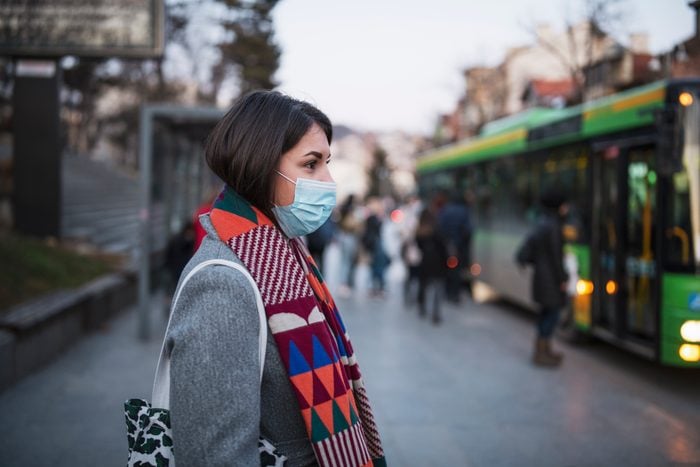
Cultural changes ahead
Over the course of the past year, we’ve made countless adaptations to living in a world with COVID-19. Precautions that started with skipping handshakes and being (much) more diligent about proper handwashing led to social distancing and face masks becoming the must-have accessory of the year. While we certainly know a lot now, including where you’re most likely to catch coronavirus and what could happen of you contract it, there’s still plenty we don’t know. One thing is certain, though: In light of how many people we’ve lost and how much coronavirus has cost the world, we don’t want to go backward. We want to keep moving forward, staying safe as the world reopens, people get vaccinated, and we inch closer toward herd immunity. But will life ever truly go back to normal? And will our pre-pandemic everyday habits be gone forever?
While it’s difficult to find a bright side to the coronavirus outbreak, one positive is that this period of global upheaval may change some of our less-than-desirable public-health habits—and improve our hygiene for good. It could also alter the way we approach work, school, and so much more. Here are 14 everyday habits that could (and should) change forever once this long-term crisis has passed.
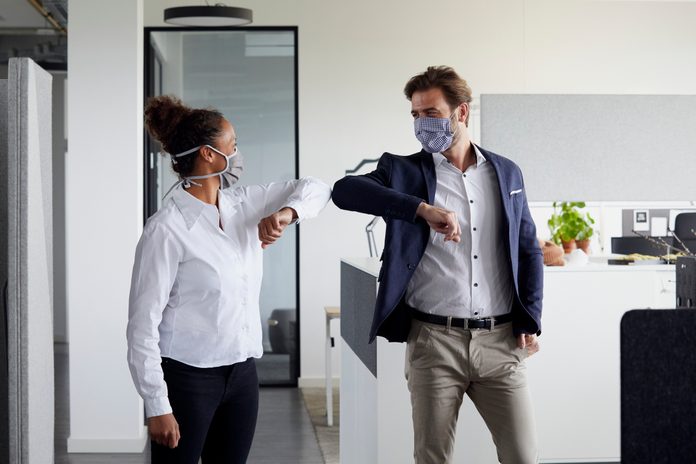
Handshakes will be out
In the earliest days of the outbreak, one of the first and most visible changes to societal norms was when people began avoiding handshakes. “In this new era of the coronavirus and the practice of social distancing, there will undoubtedly be a cultural shift in the way we all greet one another,” says Nesochi Okeke-Igbokwe, MD, an internist and health expert. “Shaking hands, high fives, hugs, and kisses are modes of greeting to be abandoned at this point. Social greetings may now entail a hand on the heart, a head nod, or pretty much any action that enables one to avoid direct touch or contact.” It’s hard to imagine this changing anytime soon.
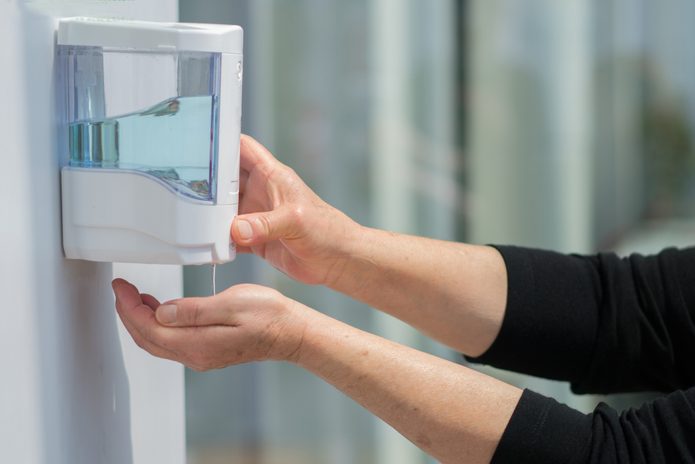
There will be more hand sanitizer available in public places
Remember last year when, at the very beginning of the pandemic, hand sanitizer became a precious commodity? With everyone scrambling to buy it—and anything else they thought might help keep them safe from the virus—we ended up with a shortage. Fortunately, that’s no longer the case, and hand-sanitizer pumps, containers, and stations are basically everywhere now.
This is something that is very likely to continue—especially in places like offices, public spaces, and entertainment events. “It would no longer be rare [to see hand-sanitizer stations in office buildings],” says CJ Xia, a VP of marketing and sales at Boster Biological Technology, a biotech company based in Pleasanton, California. “By placing such products around, everyone would be signaling to other people that their hands are clean.” And though many concert venues, stores, and gyms have provided hand-sanitizer dispensers for years already, we’re likely to see them stick around in places like restaurants, churches, and other establishments. And if you’re wondering, is the pandemic over? Here’s what experts have to say.
RELATED: Wash Your Hands Immediately After Touching These 10 Things

We’ll get better at responding to customer and client needs
The pandemic has forced people to form rapid-response teams that cut across functions and seniority, according to Joanne Cleaver, author of The Career Lattice and a consultant and trainer to employers and individuals on how to use lateral career strategies for sustained growth. “People have discovered that their coworkers and employees have talents that are relevant—even vital—to keeping the company operating,” she tells Reader’s Digest. “It’s up to employees to make the case, post-virus, that their employers should invest in additional training and skills development to develop the abilities that came to the fore during the crisis. And it’s on companies to extract strategic value from how people rose to the occasion.”

Our relationships with restaurants will probably never be the same
Though indoor-dining regulations vary from state to state, one thing is consistent across the country: The past year has been extremely hard on eating establishments. In fact, it’s still hard to fully comprehend how much money the restaurant industry has lost due to COVID-19. They did catch a small break during the warmer months of the summer, when they were able to serve customers in outdoor spaces, and at this stage, many states have permitted restaurants to reopen for indoor dining, albeit at a limited capacity. Though it’s unclear exactly how many aspects of the “new normal” of restaurants will become permanent after the pandemic, it’s highly likely that there will be changes. For example, delivery and takeout options might be expanded (in case something like this happens again), and more explicit information might be posted in the restaurant about its hygiene practices.

More people may use bidets
Back during the Great Toilet Paper Panic of 2020—brought on by a shortage of TP available from both online and brick-and-mortar retailers—people began looking into alternatives to this household necessity. And while bidets that attach to your home toilet had become increasingly popular in years prior, the sales and searches of these products surged at the onset of the coronavirus outbreak. In fact, in mid-March 2020, TUSHY—a company that makes attachable bidets—already began seeing sales that were 10 times what they were before word spread of TP shortages. And that’s on top of TUSHY already selling well over double what they’d been selling a year prior, according to a rep from the company.
If we’ve learned one thing already from this pandemic, it’s that people are extremely concerned about having enough toilet paper. Given that bidets are an alternative to (or an addition to) toilet paper, it makes sense that more people are interested in them now. Since bidets are becoming more popular and commonplace in American bathrooms, we’ll likely continue to see the toilet attachment in homes long after everyone has been vaccinated.
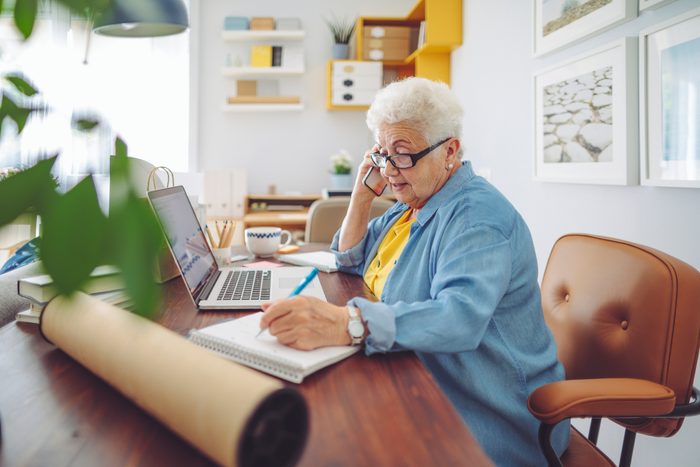
More companies will permit employees to work remotely
Prior to COVID-19, it was pretty standard to negotiate some sort of arrangement for working remotely at least part of the time when you started a new job. But after working from home became the only option for so many office workers, it’s now something that could stay virtual forever. In fact, after seeing that adults are capable of doing their jobs in a location other than a cubicle, some companies and organizations decided to give up their physical office space. Moving forward, Tracy Cote, the chief people officer at Zenefits, says that remote work will be the norm. “COVID-19 accelerated the efforts of remote work for many companies, and hiring people virtually will become a standard part of new workplace practices,” she tells Reader’s Digest. This could help increase employee happiness and create a more global, diverse workforce, among other things. Here are more positive ways the world may change after coronavirus.
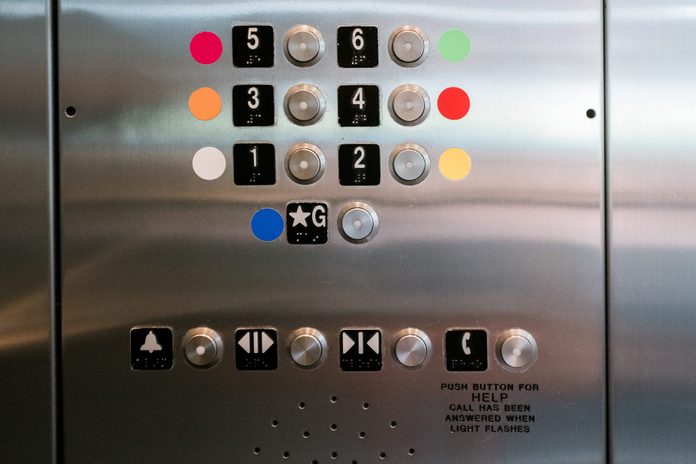
We’ll find another way to press buttons
Even before coronavirus became an issue, most of us knew that certain everyday locations were laden with germs. These places include buttons on ATMs, the credit-card swiper at the grocery store (and the attached pen), and buttons in an elevator. Dr. Okeke-Igbokwe predicts that even after the pandemic is under control, people may still be hesitant about pushing elevator buttons with their fingers and may instead do so with their elbow or even an object like a pen. “The same goes for pushing your pin number at the ATM or making a purchase at a store,” she adds. “Directly touching the keypads with your fingers will be an action of the past.”
Nikola Djordjevic, MD, cofounder of HealthCareers, agrees. “A lot of people have gotten rid of the habit of pressing elevator buttons or touching handles with their hands,” she explains. “Ideally, people should cover their skin with clothes or simply press buttons with elbows. In case they accidentally use their fingers, people should avoid touching their face until they get a chance to wash hands with soap.”

It may be the end of communal foods
Free food is great, but let’s be honest: Those bowls of popcorn and nuts at bars were always kind of suspect. After all, just how many people used the restroom, didn’t wash their hands, and then helped themselves to a scoop of snacks via their very dirty hands? Between that and COVID, people may not be as keen to eat out of communal food containers ever again. Over the past year, we’ve already seen how COVID-19 has changed salad bars. And Dr. Okeke-Igbokwe says we’ll probably also see people avoiding buffets, even once the pandemic is over, along with “a greater focus on purchasing ingredients to prepare your own meals as hygienically as possible at home.”
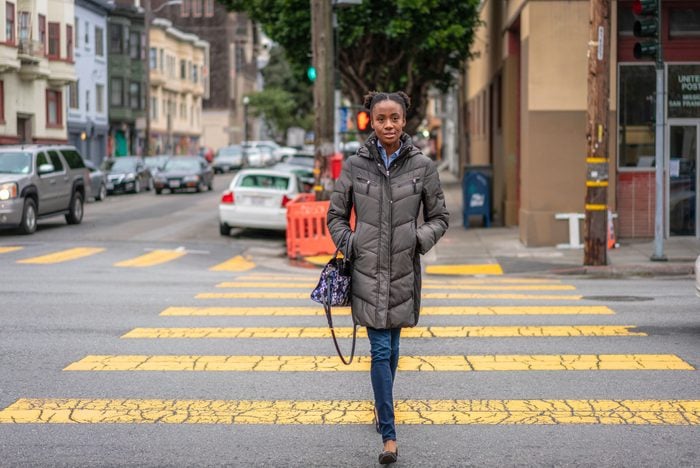
People will continue to take their personal space more seriously
One of the first tools the public was given to combat the spread of the novel coronavirus was a long-established public health practice called “social distancing,” which, as we all know now, involves maintaining a distance of at least six feet between yourself and another person. Over the months, public health officials attempted to phase out the term social distancing in favor of physical distancing, because they were concerned that telling everyone to distance themselves from people “socially” sent the wrong message. While many people have been taking this policy seriously, others have not. That said, along the way, we’ve learned how to handle social distancing rule breakers.
While we probably won’t be as strict about keeping six feet between ourselves and others after the pandemic is over, a version of it will likely continue, says Dmytro Okunyev, the founder of Chanty, a team chat platform that uses artificial intelligence. “People will start paying more attention to whom they let approach them in their personal space, and the socially acceptable personal distance will change in most cultures,” he tells Reader’s Digest.

We’ll be better at washing our hands
Back at the very beginning of the outbreak—before anyone (including scientists) fully understood the capabilities of the virus, and prior to any type of treatment or vaccine being available—there were few actionable things we could do to help keep ourselves and those around us safe. One exception to that was handwashing. If there was one thing we heard over and over about preventing the spread of the coronavirus, it was that we should vigorously wash our hands as often as possible for 20 seconds, or use a hand sanitizer with an alcohol content of at least 60 percent when we couldn’t get to a sink. There was good reason for the repetition: A survey published in January 2020 found that 40 percent of Americans don’t always wash their hands after using the restroom.
Ideally, once the pandemic has passed, we’ll keep up these good handwashing habits. These handwashing guidelines weren’t just introduced for COVID-19, by the way—this is what we should have been doing all along. If something good emerges from this crisis, it will be that more people will become aware of the importance of washing their hands and make it a habit moving forward, because there are at least 15 diseases you can prevent just by washing your hands.
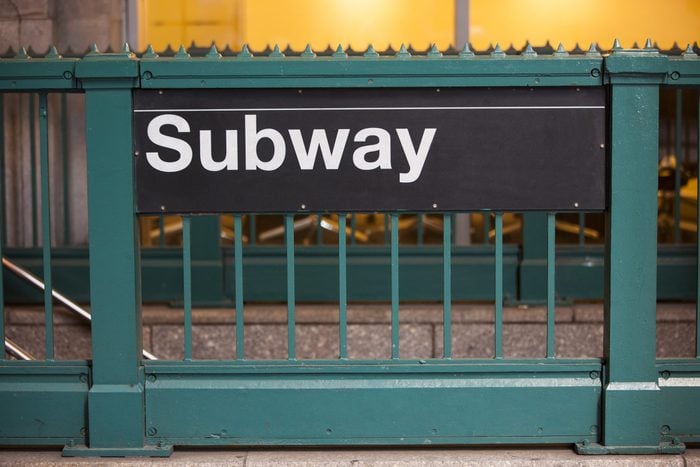
We may rethink entering crowded indoor spaces, including public transit
It always happens when you’re running late: You get to the train and it’s incredibly crowded, or you finally get an elevator and it’s already full of people. In situations like those, it’s tempting to wedge yourself in there—comfort (of you and your fellow passengers), be damned. But since the beginning of the COVID-19 pandemic, towns, cities, and states across the country have put new rules on the books that place limitations on the number of people permitted in indoor spaces, based on guidelines from the Centers for Disease Control and Prevention (CDC).
While we may miss being around other people in situations like concerts or sporting events, it’s been kind of nice not having to navigate crowds. At this point, it’s still unclear how many—if any—of the restrictions on the capacity of public indoor spaces will remain once the pandemic is over, but we’d like to think that people will think twice before stuffing themselves onto an already-full bus or subway car.
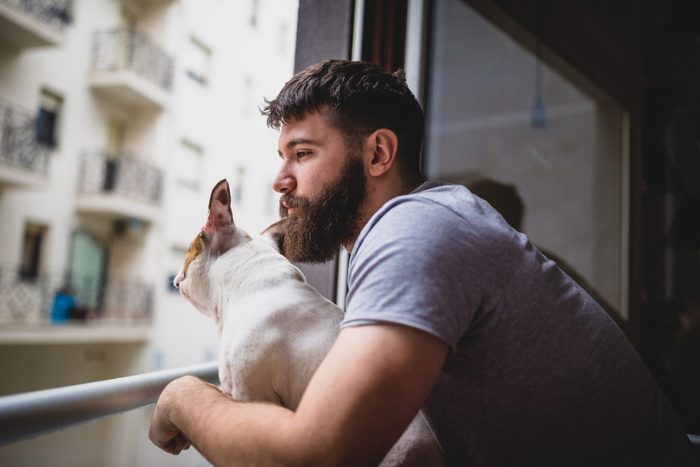
We may have a better understanding of public health ethics
There’s a recurring theme in comments from people who aren’t taking the virus seriously or who flat-out think it’s a hoax: They don’t think it will affect them. But these people are missing the point when they refuse to wear face masks and continue to hold large family gatherings. The point of staying home and practicing physical distancing isn’t only to protect yourself—it’s also to make sure you don’t pass the virus along to other people, especially those who are especially vulnerable (like the elderly and immunocompromised). We also know that even if you don’t feel sick, you could still be an asymptomatic carrier and infect other people. This outbreak has been a lesson on a main tenet of public health ethics: that sometimes you have to put your own autonomy on the back burner for the greater good. Once we’ve made it to the other side of this pandemic, hopefully we’ll do so with a better understanding of public health and continue the habits we’ve learned.

Schools and universities will be more prepared for distance learning
For many people—parents in particular—schools and universities suspending in-person learning has been one of the biggest adjustments of the past year. While many educational establishments have since moved from a virtual classroom back into a real one, we’ve learned a lot after a year of Zoom school. Ideally, this will translate to schools and universities being far more prepared in the event that a public health crisis of this magnitude were to happen again. And even when things are back to normal, there are a few things you may never see in schools again.
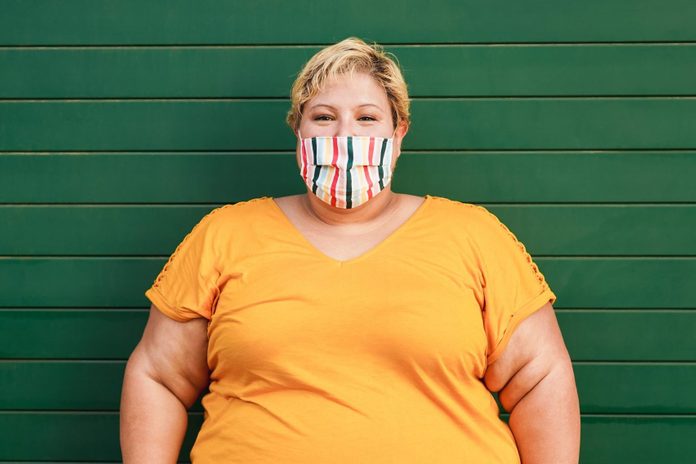
Wearing a face mask when you’re sick (or think you might be) will probably be normal
Unless you worked in the health care industry or were a caregiver for someone with a compromised immune system, you probably didn’t have a lot of experience with face masks prior to last year. And boy, did 2020 take us on quite the face mask journey. At the beginning of the coronavirus outbreak, public health officials told us not to wear face masks because we needed to save them for hospital staff—and unless they were official N95 masks, they weren’t that beneficial, anyway. But following the results of some preliminary research on how the virus spread, public health officials then told us that we should wear a face mask and that it did not need to be an N95 (which were still in short supply).
And on April 3, 2020, the CDC recommended that people wear a cloth face covering in public to slow the spread of COVID-19. Since then, face masks—a simple piece of fabric meant to protect your health and the health of those around you—have managed to become highly politicized, seen by some as an infringement of their personal freedom and liberty. Anti-maskers aside, now that we understand how face masks work and why they’re an important tool in limiting the spread of infectious disease, there’s a good chance that (some) people will continue to wear them when they’re out in public when they’re sick—even long after the COVID-19 pandemic has ended.
Sources:
- Nesochi Okeke-Igbokwe, MD, an internist and health expert
- CJ Xia, a VP of marketing and sales at Boster Biological Technology
- Rolling Stone: “As Toilet Paper Stock Plunges, Bidets Are Making a Splash”
- Tracy Cote, chief people officer at Zenefits
- Nikola Djordjevic, MD, cofounder of HealthCareers
- Health Affairs: “Stop Using The Term ‘Social Distancing’ — Start Talking About ‘Physical Distancing, Social Connection’”
- Dmytro Okunyev, the founder of Chanty
- YouGov: “40% of Americans don’t always wash their hands after going to the bathroom”
- Indiana University School of Medicine: “The Ethics of Coronavirus”
